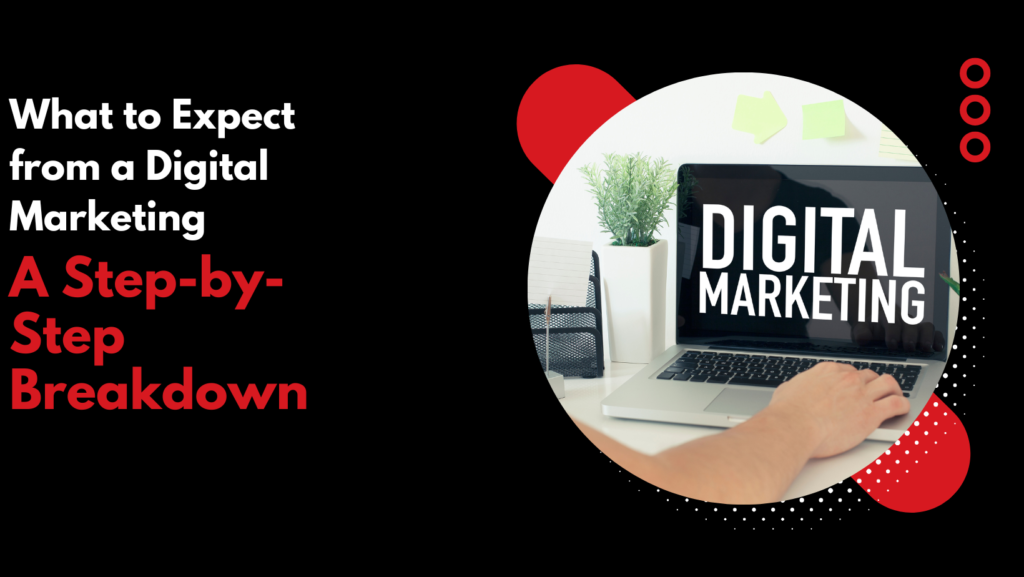Introduction
In today’s digital era, businesses and individuals rely on online platforms to enhance visibility, generate leads, and drive sales. Digital marketing has become an essential skill, opening doors to lucrative job opportunities, freelancing gigs, and business growth. Whether you’re a student, entrepreneur, or marketing enthusiast, enrolling in a digital marketing course can be a game-changer.
But what exactly does a digital marketing course entail? This guide provides a step-by-step breakdown of what to expect from a comprehensive digital marketing program.
Step 1: Introduction to Digital Marketing
Before diving into advanced topics, most courses start with an overview of digital marketing. This includes:
- Understanding digital marketing fundamentals.
- Comparison between traditional and digital marketing.
- The role of digital marketing in modern businesses.
- Career opportunities in digital marketing.
This foundational knowledge prepares learners for the in-depth modules ahead.
Step 2: Website Development & Optimization
A strong online presence starts with a well-optimized website. Many digital marketing courses cover:
- Basics of web development using WordPress, Wix, or other platforms.
- Importance of mobile-friendly and responsive designs.
- SEO-friendly website structure and layout.
- Best practices for user experience (UX) and interface (UI).
This module is crucial as a well-structured website forms the backbone of any digital marketing strategy.
Step 3: Search Engine Optimization (SEO)
SEO is one of the most important pillars of digital marketing. A good course will teach:
- How search engines work.
- On-page SEO techniques (meta tags, keyword optimization, internal linking, etc.).
- Off-page SEO (backlink building, guest posting, social signals, etc.).
- Technical SEO (site speed optimization, schema markup, XML sitemaps, etc.).
- SEO tools like Google Analytics, Ahrefs, and SEMrush.
By the end of this module, learners will understand how to rank websites higher on search engines and drive organic traffic.
Step 4: Pay-Per-Click (PPC) Advertising
Paid marketing plays a significant role in digital marketing. This module covers:
- Introduction to Google Ads and Bing Ads.
- Keyword research for paid advertising.
- Types of PPC campaigns (Search, Display, Shopping, Video, etc.).
- Ad creation and optimization techniques.
- Budgeting and bid management strategies.
- Analyzing ad performance and improving ROI.
Understanding PPC ensures that learners can generate quick and effective results through paid marketing.
Step 5: Social Media Marketing (SMM)
Social media is a powerful tool for brand building and engagement. This module teaches:
- How to create and optimize business pages on Facebook, Instagram, LinkedIn, Twitter, and other platforms.
- Strategies for content creation and audience engagement.
- Paid advertising on social media (Facebook Ads, Instagram Ads, LinkedIn Ads, etc.).
- Influencer marketing and brand collaborations.
- Analytics and performance measurement tools.
SMM helps businesses create a strong online presence and interact effectively with their target audience.
Step 6: Content Marketing & Blogging
Content is the backbone of digital marketing. A comprehensive course will include:
- Content strategy development.
- Types of content (blogs, videos, infographics, case studies, etc.).
- Writing SEO-friendly content.
- Content promotion techniques.
- Tools like Grammarly, Hemingway, and Yoast SEO.
This module equips learners with skills to create compelling content that attracts and retains customers.
Step 7: Email Marketing & Automation
Email marketing remains one of the highest ROI digital marketing channels. Expect to learn:
- Email marketing strategy and segmentation.
- How to build an email list organically.
- Writing engaging email content.
- Email automation using platforms like Mailchimp and HubSpot.
- Measuring email campaign performance.
By mastering email marketing, learners can nurture leads and convert them into customers effectively.
Step 8: Affiliate Marketing & Monetization
Many digital marketers earn through affiliate marketing. This module covers:
- Understanding affiliate marketing.
- Selecting profitable affiliate programs.
- Strategies for driving traffic and conversions.
- Platforms like Amazon Associates, ClickBank, and ShareASale.
- Ethical practices and compliance with regulations.
Affiliate marketing knowledge helps individuals monetize their online presence effectively.
Step 9: Video Marketing & YouTube Optimization
Video content dominates the internet. This module includes:
- Basics of video creation and editing.
- YouTube SEO and ranking strategies.
- Monetization techniques through YouTube ads.
- Best practices for engagement and audience retention.
- Tools like Canva, Adobe Premiere Pro, and InVideo.
Video marketing enhances brand storytelling and boosts audience engagement.
Step 10: Analytics & Data-Driven Marketing
Data is the key to refining digital marketing strategies. Expect to learn:
- Google Analytics fundamentals.
- Tracking user behavior and conversion rates.
- Performance metrics for websites and campaigns.
- How to use data to optimize marketing strategies.
- A/B testing and performance measurement tools.
Data-driven marketing ensures that campaigns are optimized for maximum effectiveness.
Step 11: Digital Marketing Strategy & Case Studies
Once learners grasp individual digital marketing components, courses often conclude with:
- Developing a full-fledged digital marketing plan.
- Analyzing real-world case studies.
- Practical projects to apply learned skills.
- Career guidance and freelancing opportunities.
A well-structured strategy module helps learners transition from theory to practice.
Step 12: Certification & Career Guidance
Most reputable digital marketing courses provide certifications, such as Google Ads Certification, HubSpot Content Marketing Certification, and Facebook Blueprint Certification. Additionally, they offer career guidance, including:
- Resume-building tips for digital marketing roles.
- Interview preparation.
- Freelancing and entrepreneurship insights.
These certifications and career resources add credibility and improve job prospects.
Conclusion
A digital marketing course is a valuable investment, equipping learners with skills to thrive in the online world. From SEO and PPC to social media and content marketing, these courses cover all essential aspects step by step. By enrolling in a structured program, you gain practical knowledge and hands-on experience to grow businesses, land high-paying jobs, or start your own digital marketing agency.
If you’re considering a digital marketing course, ensure that it offers comprehensive training, real-world projects, and industry-recognized certifications. With dedication and practice, you can master digital marketing and open new doors of opportunity in the digital world.

